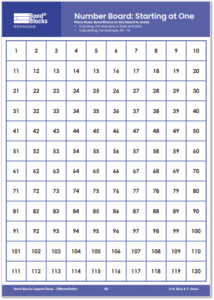31) Starting at Twenty: Using Words
Counting Backwards from 20

Understanding Activity
This is an ‘understanding’ (proficiency strand) activity.
Please refer to the instructions in the appropriate Implementation Planner for your context.
Mathematics
- Develop fluency counting backwards in the correct order from 20 to 10.
- Connect the length of the Bond Blocks and number name.
- Identify numbers from 11 to 19 as a two-part bond made of 10 plus a single-digit number.
Language
- One shorter.
- One less than.
- One number before.
- A number is made up of digits in the same way a word is made up of letters. The number 16 is made up of the digits one and six.
- Place value: The place of a digit in a number determines the digit’s value (worth).
- In the number 16 the digit one is in the tens place so is worth one ten, ten.
- The digit six is in the ones place so is worth six ones, six.

Differentiation
A little easier
Correcting ‘teen’ and ‘ty’ Errors
Please read the Teacher Note “Correcting ‘teen’ and ‘ty’ Errors” pages 78 – 83.
A little harder
AAA
P
AAA
P

